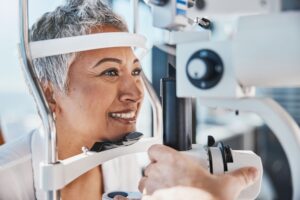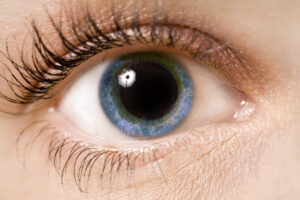Eye exams play a crucial role in maintaining the health of your eyes and the clarity of your vision. Every time you visit your eye doctor for an exam, you are helping to ensure that your eyes are healthy and not at risk for any eye conditions that could potentially cause harm to your vision.
There are many important parts of an eye exam. It is crucial to prepare for each eye exam to ensure your eye doctor has all the information for a thorough evaluation.

Keep reading to learn eight things your eye doctor wishes you knew before your next eye exam!
1. Regular Eye Exams Are Important
Regular eye exams are essential because they can uncover underlying eye conditions like glaucoma and macular degeneration that often progress silently, causing irreversible damage if left undetected. By detecting these issues early, your eye doctor can help preserve your vision and prevent more severe complications down the road.
2. Know Your Family History
It’s important to inform your eye doctor about any eye conditions or diseases that run in your family, as some eye conditions may have a genetic component. Understanding your family’s eye health history is vital as it can provide valuable insights into your risk factors for hereditary eye conditions.
By sharing this information with your eye doctor, they can tailor their examination and recommendations to suit your specific needs, allowing for proactive management and prevention of potential genetic eye disorders.

3. Bring Your Glasses and Contacts
If you wear glasses or contact lenses, bring them to your appointment. Your eye doctor may want to check your current prescription and evaluate how well it is working for you.
Bringing your current glasses or contact lenses to your eye appointment is crucial for accurately assessing your vision needs. Your eye doctor can use these as a baseline to evaluate any changes in your prescription.
It also allows them to ensure that your eyewear is still effective in providing optimal vision correction, which helps you maintain clear and comfortable vision.
4. Be Prepared for Pupil Dilation

Your eye doctor may need to dilate your pupils during the exam to get a better view of your retina. This can temporarily affect your vision, making it difficult to focus on close objects and causing sensitivity to light.
Pupil dilation is a routine part of eye exams, and it allows your eye doctor to thoroughly examine the back of your eye for signs of any eye conditions or damage. While it may temporarily affect your vision, causing sensitivity to light and difficulty focusing on close objects, this part of the eye exam is essential for fully evaluating your eye health.
The effects of dilation usually wear off within a few hours, so make sure to bring sunglasses to your appointment.
5. Ask Questions
Don’t hesitate to ask questions about your eye health, any prescribed treatments, or recommended lifestyle changes. Asking questions during your eye exam is a proactive way to take charge of your eye health.
Open communication ensures that you have a clear understanding of your eye health and empowers you to make informed decisions about your vision.
6. Discuss Any Changes in Vision
If you’ve noticed changes in your vision, even if they seem minor, it’s important to tell your eye doctor. This information can be crucial for diagnosing and managing eye conditions.
Timely communication of even minor changes in your vision is essential as it can be a key indicator of underlying eye issues. By discussing these changes with your eye doctor, they can evaluate your eyes and initiate treatment or adjustments to your vision care plan, ensuring optimal eye health and clarity of vision.
7. Eye Health Is Connected to Overall Health
Your eye doctor may ask about your general health, medications, and lifestyle habits as they can impact your eye health. Conditions like diabetes and high blood pressure can affect your eyes.
Understanding the broader context of your health helps your eye doctor provide more well-rounded care. Information about medical conditions, medications, and lifestyle factors like smoking or diet can reveal potential risk factors and guide your eye doctor in developing a comprehensive eye care plan that addresses both your eye health and overall well-being.
 8. Protect Your Eyes from UV Exposure
8. Protect Your Eyes from UV Exposure
UV radiation from the sun can harm your eyes and increase the risk of cataracts and other eye problems. Wear sunglasses that block UVA and UVB rays when outdoors.
Shielding your eyes from harmful UV radiation is essential to reduce the risk of eye conditions and maintain long-term eye health. Investing in high-quality sunglasses that offer UVA and UVB protection not only safeguards your eyes from potential damage but also contributes to your overall comfort and visual clarity during outdoor activities.
Is it time for you to have an eye exam? Schedule an appointment at Blaine Eye Clinic in Blaine, MN, today!

 8. Protect Your Eyes from UV Exposure
8. Protect Your Eyes from UV Exposure



